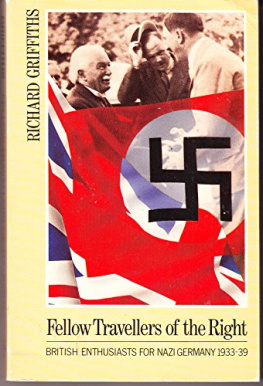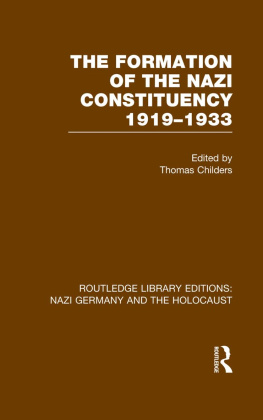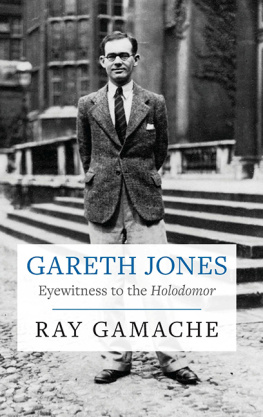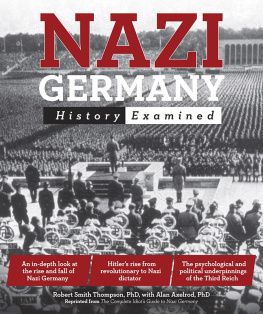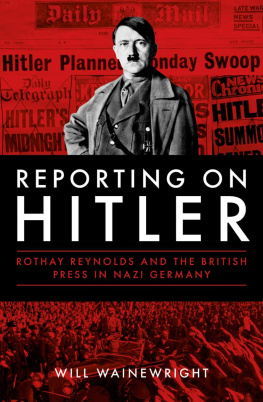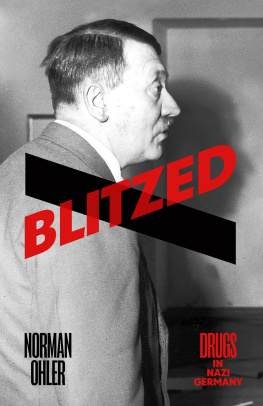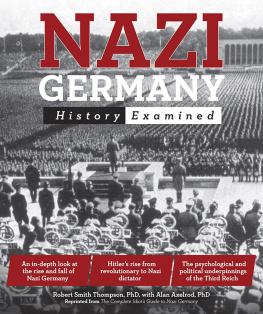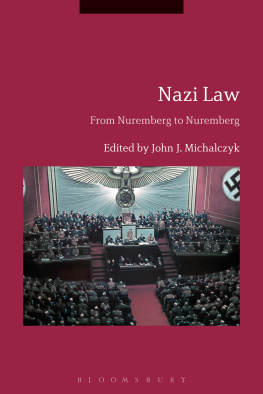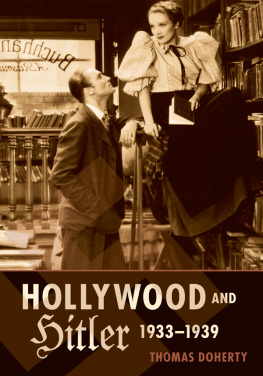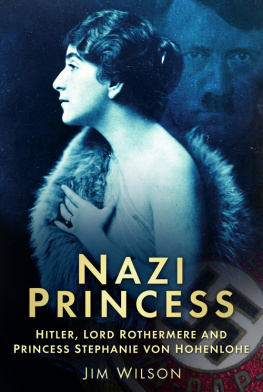Preface
S OME EFFORT is required in the 1960s, wrote K. W. Watkins in 1963, to grasp the extent of the hold which anti-French and pro-German feelings had on sections of the British Right in the 1930s.
This book is an attempt to study the various forms of motivation which led to this phenomenon. It is also an attempt to assess the years in which approval for Nazi Germany became greater or less, and the possible reasons for these changes.
A great deal of work has, of course, been done on appeasement. This, though it is a related subject, is not, however, the theme of this book. The appeasers, in the late thirties, were people who, because of the specific political situation, and for varying reasons, were convinced that it was essential to seek an accommodation with Germany; they were not necessarily friendly towards Germany herself in abstract, or in favour of the Nazi rgime.
I have used the word enthusiasts in order to differentiate those people who will be our main area of study. There were varying degrees of enthusiasm, as we shall see, and it was not always at white heat. What was the common factor to them all was a propensity to positive statements of approval of Germany. In some, this was extended to detailed approval of the Nazi internal rgime; in others, certain aspects of that rgime had to be excused, or ignored, in favour of those aspects which had attracted approval.
Naturally, alongside these people we shall also have to consider the whole spectrum of other favourable attitudes to Germany, including those of appeasement itself, in order to gain a more complete picture of the background against which our enthusiasts were acting; though so much has already been written on this area that it has not been necessary to deal with it in such detail as the central theme.
It must above all be stressed that this study, by its nature, is concerned with just one aspect of the many-sided political life of the thirties. That one aspect holds the centre of the stage, to the extent that, unless read with care, the book may seem to present a one-sided view. Its central themes must be considered in relation to the political life of the period as a whole, for a balanced picture to emerge. Above all, it must be stressed that we are dealing with public opinion, rather than with the areas of decision-making in government.
The people with whom this book deals were, in most circumstances, a sizeable minority of public opinion rather than anything more. At times they were substantial enough to have some effect upon public policy, however; and even if there had not been this contemporary political importance, an assessment of their motivation is of general interest, in that it throws considerable light on the nature of certain kinds of political behaviour.
They were apologists. They are interesting because they were sufficiently convinced of the Tightness of their views to make them public, either by voicing them in print, or by joining groups which did so. It is in various printed forms that one finds their conscious explanation of the reasons for which they held their views, and the attempt to persuade others to join them. Some wrote books; many wrote articles in dailies, weeklies and monthlies; others wrote letters to the newspapers. By the nature of the subject, most of the primary material has therefore been culled from public print; though occasional, limited use has been made of memoirs and letters.
There is one major problem in such a study. By the nature of things, it is the more prominent and more educated members of society who have the opportunity to express themselves, and to have their words remembered. The case-histories are therefore, more often than not, taken from the lites. It has been possible, nevertheless, to gain some impression of the extent to which their opinions were followed by other members of society. There is, for example, the local Press in the provinces; there is also the information we possess as to the membership, in certain areas, of groups devoted to Anglo-German friendship; there are the memoirs of those who came into contact with ordinary people. One can add to these the uncertain information provided by the predecessors of our modern opinion polls. Such information is, of course, incomplete, but it is better than nothing, and a fairly coherent picture emerges of the background, at various stages, against which the apologists were working.
Among the prominent apologists, it has usually been possible to choose specific examples to illustrate in detail the various trends involved. To have gone into the same amount of detail for a larger number of protagonists would have lengthened the book immeasurably, without adding very much to our knowledge. It has nevertheless been impossible, if such a study is to be complete, to avoid all reference to people who are still alive. Certain figures are essential to the depiction of a trend, or of a complex series of motives.
The appraisal of peoples reasons for holding opinions which, at first sight, appear unfortunate, is a fascinating task. Nobody holds opinions which they feel to be wrong; one must therefore attempt to see things through these peoples eyes, to assess what they felt to be right, and why. It is important to realise that, for a number of the proponents of Nazi Germany, these motives were of the highest. Some prominent figures emerge from this study as men of high principle and integrity, who were led into admiration for Germany not by any other factors, but by all that was best in them a concern for the condition of the working man, a belief in a spiritual lead, or a propensity to see the best in everyone and everything. Others, of course, had motives for their beliefs which were more in tune with the basic nature of Nazism. It is this very variety of motivation that is of interest and which creates the difficulty of making too many generalisations about the matter.
Pro-Germanism, and pro-Nazism, could be carried to extremes; some of the British extremist groups which pursued anti-Semitic policies, for example, were among the most violent supporters of the Nazi rgime. In one sense, however, they were atypical of public responses in general. Though they are a necessary part of our study, they are merely one aspect of British pro-Nazism. Strangely enough, whenever the subject of this book has been mentioned in conversation, the immediate response has been: Mosley. Yet, as will be seen, Mosley, and his followers, and other Fascist movements do not play a central role until the very latest stages, when all except extreme support for Nazi Germany had been withdrawn. The extremist movements, for most of the period, existed alongside other enthusiasts, who were often more concerned to explain or to ignore certain Nazi internal policies than to praise them, and whose praise was reserved for other aspects of the rgime.
The pattern of British pro-Nazism is at first sight surprising. After a slow start in the 19335 period, it reached a high peak in the years 1936 and 1937, after which it gradually declined until, at the outbreak of war, it was confined to extremist groups and isolated outcrops of specially motivated approval.
In order to depict this pattern, the sections of the book have been organised in the following manner. The period from 1933 to 1935 has been treated as a whole, with the various areas of support for Nazi Germany being examined alongside each other, together with allied opinions which might have been presumed to lead to pro-Nazism, but often did not. Questions of motivation are seen to be extremely diverse, and individual cases have to be examined at length. Then, from 1936 onwards, the subject is considered chronologically, under the impetus of events. 1936 is seen to be the time when many people, this time more coherently recognisable as social and political groups, came over to support for Nazi Germany; 1937 is seen as a year in which, with slight variations, this position was maintained. In Section Three, we have the decline from 1938 onwards, when support was gradually withdrawn. The various reasons for this withdrawal, and the timing of it in individual cases, are possibly even more significant than the reasons for the initial support.

